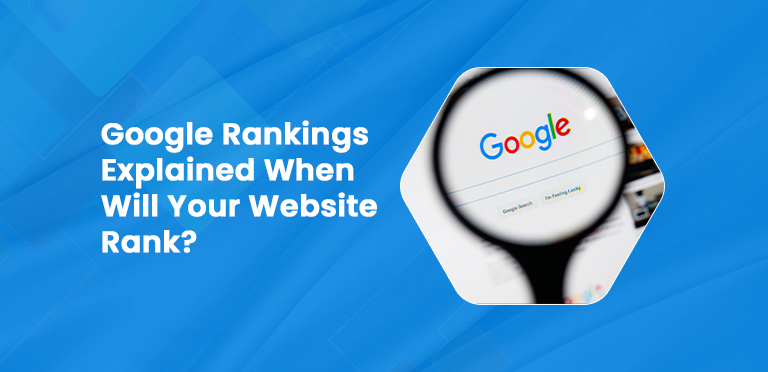Google Rankings Explained: When Will Your Website Rank?



If you have launched a website, you might be wondering, “When will my website rank on Google?” The truth is, there’s no fixed answer. Google rankings depend on multiple factors, including content quality, SEO efforts, backlinks, and competition.
For businesses, ranking on Google is crucial for visibility, traffic, and conversions. A higher ranking means more people will find your website when they search for relevant terms. However, getting to the top of Google’s search results takes time and requires patience and effort.
In this blog, we’ll break down how Google rankings work, how long it takes to rank, and what you can do to improve your ranking faster.
Understanding Google’s Ranking System
To understand how Google ranks websites, it’s important to know that the process involves three main steps:
Crawling
- Google has bots called Googlebots that constantly search the internet for new and updated pages.
- These bots follow links from one webpage to another, gathering information along the way.
- If your website is new or has poor internal linking, Google may take longer to discover your pages.
Indexing
- Once Google discovers a page, it analyzes and stores its content in a massive database called the Google Index.
- If your website has high-quality, well-structured content, it will be indexed faster.
- Schema markup can help Google understand your content better and rank it correctly.
Ranking
- When someone searches for a keyword, Google pulls the most relevant, useful, and high-quality pages from its index.
- The ranking depends on over 200 factors, including content relevance, website speed, backlinks, and user experience.
- Local businesses can improve their ranking by optimizing for local SEO, ensuring they appear in searches relevant to their geographical location.
Google Algorithm Updates That Impact Ranking
Google frequently updates its ranking algorithm to improve search results. While some updates are minor, others significantly affect website rankings.
Major Google Algorithm Updates and Their Impact
Panda (2011)
- Focused on content quality
- Penalized websites with thin, duplicate, or low-value content.
- Encouraged businesses to publish original, well-researched, and valuable content.
Penguin (2012)
- Targeted spammy backlinks
- Websites using black-hat SEO tactics (like buying backlinks) saw ranking drops.
- Google now prioritizes organic, high-quality backlinks from trusted sources.
Hummingbird (2013)
- Improved search intent understanding
- Google started focusing on the meaning behind search queries, rather than just keywords.
- This made long-form, well-structured content more valuable.
RankBrain (2015)
- Introduced AI-powered ranking factors
- Google began using machine learning to better interpret search queries.
- User engagement metrics, such as click-through rates and bounce rates, became more important.
BERT (2019)
- Enhanced natural language processing
- Google became better at understanding conversational searches.
- Websites with clear, human-friendly content benefited from this update.
Helpful Content Update (2022-2023)
- Prioritized people-first content
- Websites that provide real value to users rank higher.
- AI-generated or thin content designed just for SEO is penalized.
- Investing in high-quality web design also plays a role in user engagement. Read more about effective web design strategies here.
How to Stay Safe from Google Penalties?
- Focus on user experience: Make your site fast, mobile-friendly, and easy to navigate.
- Avoid duplicate content: Ensure each page provides unique and valuable information.
- Build high-quality backlinks: Avoid spammy, low-authority links.
How Long Does It Take to Rank on Google?
Many website owners ask, “How long does it take to rank on Google?” The answer depends on multiple factors, but in general:
- For low-competition keywords: 3-6 months
- For high-competition keywords: 6-12 months or more
Why Does Ranking Take Time?
Google needs to crawl, index, and evaluate your website before it ranks it. If your site is new, Google doesn’t trust it yet. Over time, as you publish high-quality content and earn backlinks, your ranking improves.
Case Study: Fast vs. Slow Ranking
Fast Ranking Example:
- A local SEO-optimized business website can rank in weeks if it targets niche, low-competition keywords.
- Using strategies like schema markup for local SEO can further boost ranking. Learn more here.
Slow Ranking Example:
- A brand-new blog competing for a highly competitive keyword (e.g., “best running shoes”) may take over a year to rank.
- The website needs consistent content updates, strong backlinks, and engagement before ranking improves.
Can Paid Ads Speed Up Ranking?
No. Google Ads do not directly impact organic rankings. However, running paid ads can drive traffic, brand awareness, and engagement, which may indirectly help with SEO.
Factors That Influence How Fast Your Website Ranks
Several factors determine how quickly your website moves up Google’s search results.
1. Website Age & Domain Authority
- Older websites with a history of quality content and backlinks rank faster.
- New websites must build credibility over time.
2. Keyword Selection & Competition
- Low-competition, long-tail keywords rank faster than broad, high-competition keywords.
- Example: “Best running shoes for beginners” ranks faster than “running shoes.”
3. Content Quality & Relevance
- Google prioritizes content that follows E-E-A-T (Experience, Expertise, Authoritativeness, and Trustworthiness).
- Articles with detailed insights, statistics, and expert opinions rank higher.
4. On-Page SEO Optimization
- Optimizing title tags, meta descriptions, and header tags improves ranking speed.
- Internal linking helps Google understand your site structure.
5. Backlinks & Authority Building
- Websites with high-quality backlinks rank faster.
- A website linked by credible sources will gain authority quickly.
6. Technical SEO & Site Performance
- Google favors fast-loading, mobile-friendly websites.
- Implementing schema markup improves how search engines interpret your content.
7. User Engagement & Behavioral Signals
- Google tracks how users interact with your website. If people stay longer and engage with your content, rankings improve.
- A well-designed website enhances engagement.
8. Local SEO & Google My Business Optimization
- Local businesses should optimize their Google My Business profile to rank faster for local searches.
- Using local schema markup can help improve visibility in location-based searches. Learn more here.
Steps to Improve Google Rankings Faster
To make your website to rank higher on Google quickly, you need to follow a structured approach. Here are the most effective steps you can take to boost your rankings in the shortest time possible:
1. Optimize Your Website’s Technical SEO
Technical SEO ensures that Google can crawl and index your website efficiently. Here’s what you need to do:
- Improve Site Speed – A slow website increases bounce rates and lowers rankings. Use tools like Google PageSpeed Insights to check your site’s speed and optimize it.
- Ensure Mobile-Friendliness – More than 60% of searches happen on mobile (Statista), so make sure your site is responsive and mobile-friendly.
- Fix Broken Links & Errors – Google dislikes sites with 404 errors, broken links, and duplicate content. Regular audits can help detect and fix these issues.
2. Focus on High-Quality Content Creation
Google prioritizes useful, original, and engaging content. Follow these guidelines:
- Write in-depth blog posts that answer user questions clearly.
- Use long-tail keywords because they have less competition and higher conversion rates.
- Keep your content updated and relevant. If your site hasn’t been updated in a while, it may be time for a website redesign.
3. Build High-Quality Backlinks
Backlinks act as votes of confidence for your website. To get quality backlinks:
- Guest post on high-authority websites.
- Get listed in local directories if you run a local business.
- Create shareable content like infographics and industry reports.
4. Optimize for Local SEO
If you run a local business, ranking for local searches is crucial. You can:
- Claim and optimize your Google My Business profile.
- Use schema markup to help search engines understand your business information.
- Encourage customer reviews to build credibility and trust.
5. Improve User Engagement & Experience
Google values how users interact with your site. Keep visitors engaged by:
- Using clear, engaging headings and bullet points to make content scannable.
- Adding videos, infographics, and images to keep users interested.
- Making navigation simple and intuitive to reduce bounce rates.
How to Track Your Website’s Ranking Progress
Improving your Google rankings is just the first step. Tracking your progress ensures that your strategies are working. Here’s how you can monitor your rankings effectively:
1. Use Google Search Console
Google Search Console helps you:
- See which keywords bring in traffic.
- Check for indexing issues.
- Track your average position in search results.
2. Monitor Keyword Rankings with SEO Tools
Use tools like Ahrefs, SEMrush, or Google Analytics to:
- Track your keyword rankings over time.
- Identify which pages are performing best.
- Spot any drops in rankings and take quick action.
3. Analyze Website Traffic Trends
Traffic data helps you understand user behavior. Look at:
- Organic search traffic – Are you getting more visitors from Google?
- Bounce rate – Are people leaving your site too quickly?
- Time on page – Do users spend enough time reading your content?
4. Conduct Regular SEO Audits
Regular SEO audits help identify issues and opportunities. You should:
- Check for broken links, duplicate content, and site speed problems.
- Ensure that your content is optimized for relevant keywords.
- Update and refresh old content to keep it relevant.
Common Myths About Google Rankings & Ranking Time
There are many misconceptions about how Google ranks websites. Let’s clear up some of the biggest myths:
Myth 1: Your Website Will Rank Overnight
Reality:
SEO is a long-term game. Google needs time to crawl, index, and evaluate your website before ranking it. Even with perfect optimization, it can take months to see results.
Myth 2: Paid Ads Improve Organic Rankings
Reality:
Running Google Ads does not directly impact your website’s organic rankings. However, paid ads can increase traffic and brand awareness, which may indirectly help your SEO.
Myth 3: More Keywords = Higher Ranking
Reality:
Stuffing your content with too many keywords can actually hurt your rankings. Google values natural, well-written content that provides value to users.
Myth 4: Backlinks from Any Website Help Rankings
Reality:
Google prioritizes quality over quantity when it comes to backlinks. A single link from a high-authority site is more valuable than 100 low-quality links from spammy websites.
Myth 5: You Shouldn’t Update Old Content
Reality:
Google prefers fresh, updated content. If your site hasn’t been updated in years, your rankings may drop. Refreshing old blog posts with new data, insights, and links can give your SEO a boost.
Conclusion
Ranking on Google takes time, effort, and a strategic approach. There is no shortcut to the top, but by following SEO best practices, optimizing content, and improving user experience, your website will rank higher over time.
To speed up the process, focus on technical SEO, content quality, backlinks, and user engagement. Regularly track your ranking progress and adjust your strategy based on what’s working. And most importantly, ignore SEO myths and stick to proven strategies.
If you’re looking for expert guidance to improve your website’s SEO and rankings, White Label SEO Providers is here to help. Whether you need local SEO, web design improvements, or technical optimizations, we provide the right solutions to get your site to the top of Google.